Page 1 of 2
Unusual and/or unique Scarabeidae
Posted: Thu Mar 09, 2023 7:36 pm
by Trehopr1
In all fairness to our Scarabaeidae enthusiasts I thought
that a thread about some of the more interesting looking
species was in order.
To start off this topic I'll begin with a unique species that
a friend of mine has in his collection.
Here is Paraheterosternus ludeckei and so far it is (the only
one) which I have encountered in any private collections that
I've seen.

In my next photograph their is an assemblage of some 3
species which are all pretty cool in their own right !
The smaller striped ones are attractive and yet "nifty" for
their very unusual antennae.
The large brown one is another true (one of a kind) that I
have encountered. About 3 (1/2) inches in length.
The 2 bottom white ones are similar (in build) to the brown
one but, their coloration is like snow. Very unique indeed.
Don't have any names for these....Sorry !

There are sure to be many notable species beyond these but,
for now this gets this thread some traction !
Re: Unusual and/or unique Scarabeidae
Posted: Thu Mar 09, 2023 11:03 pm
by bandrow
Hi Trehopr1,
Cool bugs indeed! Your white-striped specimens are some species of Polyphylla, but it's a big genus with many very similar species. Same goes for the large ones - these are all species of Lepidiota - I guess one could call them "May beetles on steroids"!
Cheers!
Bandrow
Re: Unusual and/or unique Scarabeidae
Posted: Tue Mar 14, 2023 4:45 pm
by boghaunter1
Eupatorus gracilicornis - ultra rare gynandromorph, $8,888.00 USD initial asking price about 10 years ago!
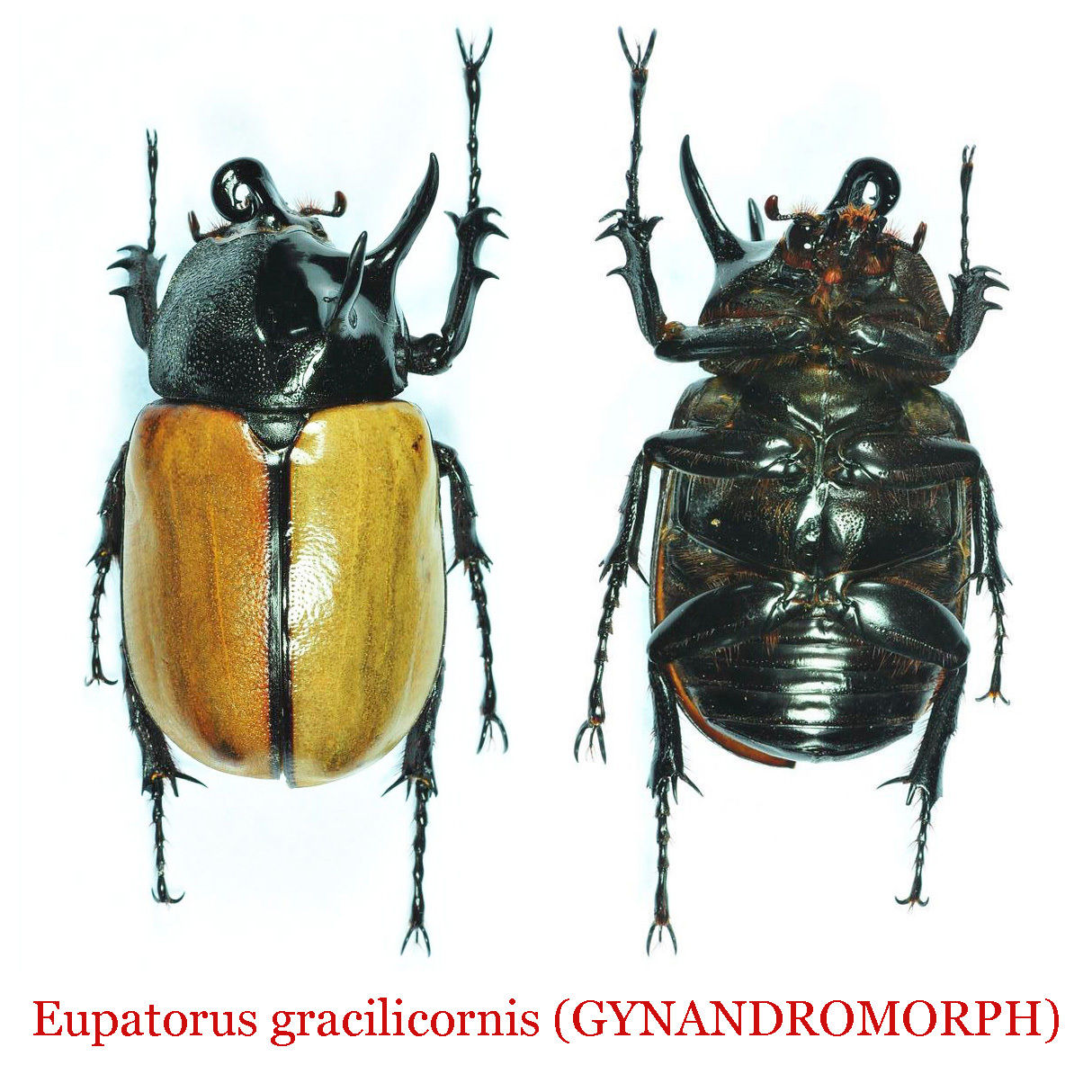
- Eupatorus gracilicornis gynander $8,888.00.jpg (257.07 KiB) Viewed 3255 times
Re: Unusual and/or unique Scarabeidae
Posted: Tue Mar 14, 2023 4:52 pm
by adamcotton
boghaunter1 wrote: ↑Tue Mar 14, 2023 4:45 pm
Eupatorus gracilicornis - ultra rare gynandromorph
Wow! Back in the 1980s I saw many thousands of these each year, but never saw anything like that.
Adam.
Re: Unusual and/or unique Scarabeidae
Posted: Tue Mar 14, 2023 5:31 pm
by boghaunter1
Another super rare gynandromorph beetle from years ago,
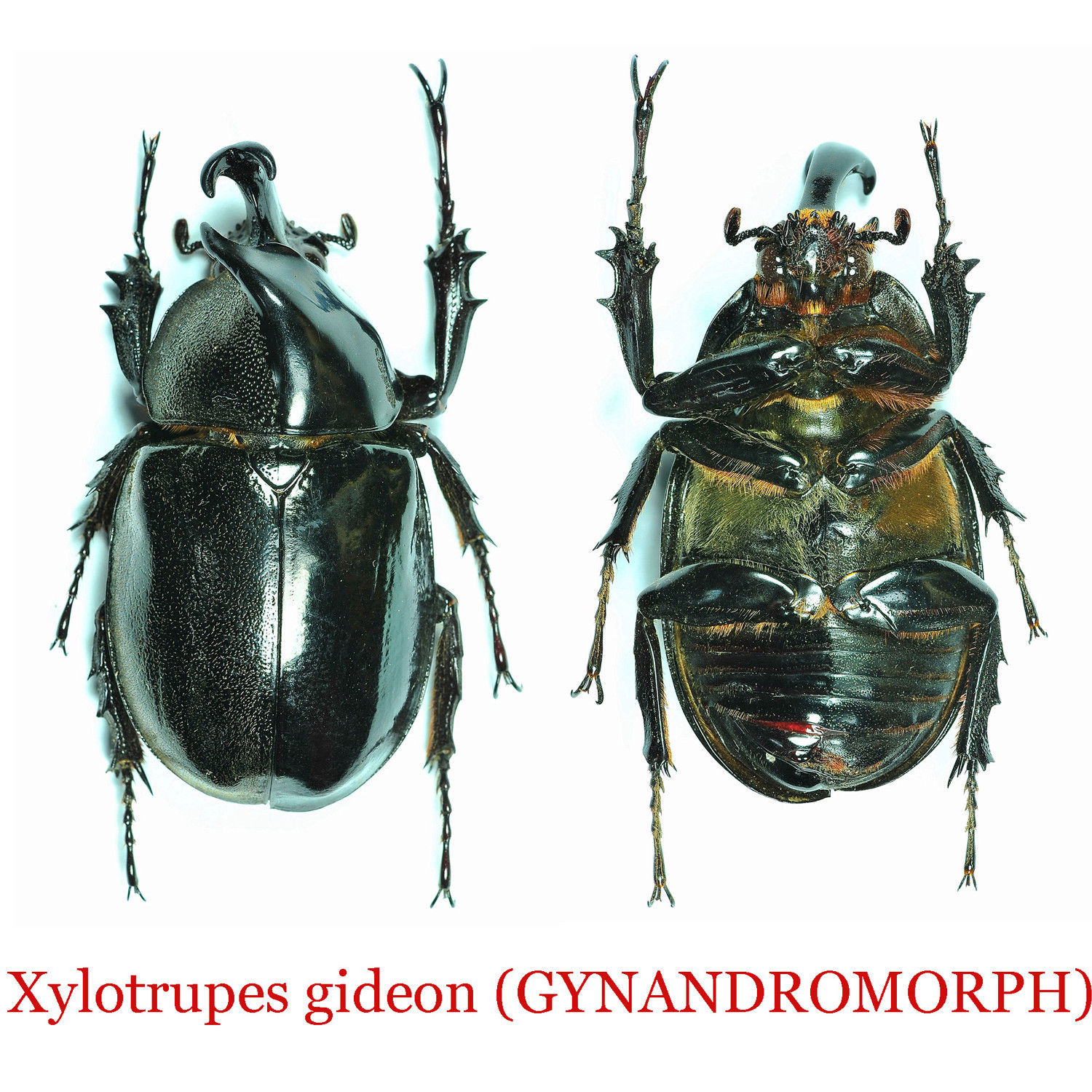
- $(KGrHqNHJFQFHYzz2CjfBR27S!(eN!~~60_57.jpg (438.48 KiB) Viewed 3251 times
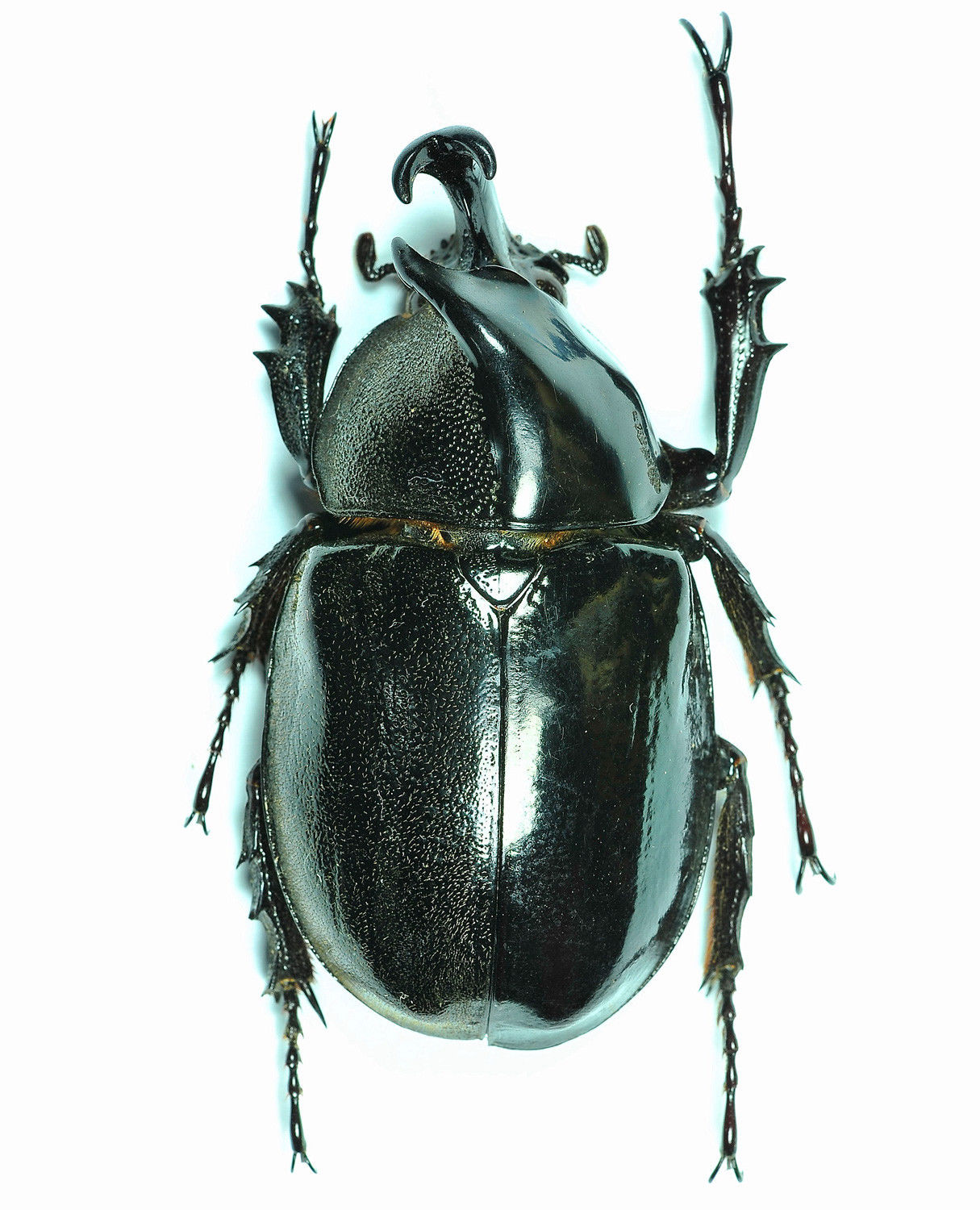
- $(KGrHqNHJBkFHKk1c2ZJBR27Rz1phw~~60_57.jpg (279.22 KiB) Viewed 3251 times
John K.
Re: Unusual and/or unique Scarabeidae
Posted: Tue Mar 14, 2023 6:10 pm
by boghaunter1
Chalcosoma atlas female with a very rare example of triple tarsal claws
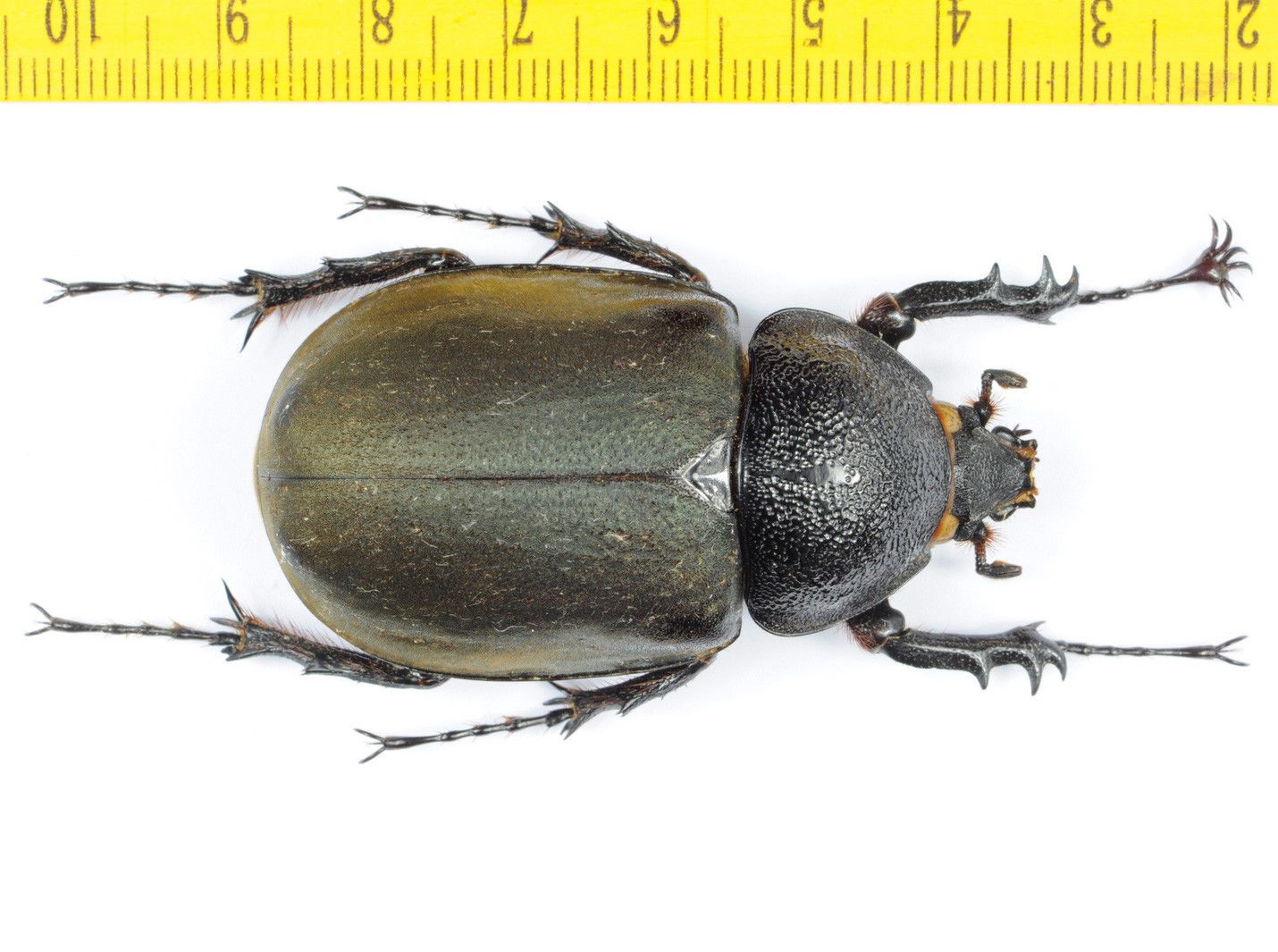
- Chalcosoma atlas female with weird tarsal claws.jpg (215.82 KiB) Viewed 3249 times
Re: Unusual and/or unique Scarabeidae
Posted: Tue Mar 14, 2023 6:15 pm
by boghaunter1
Not a scarab beetle, but a similar example of a stag beetle (Hexarthrius vitalisi), from Thailand, with a very rare double set of tarsal claws,
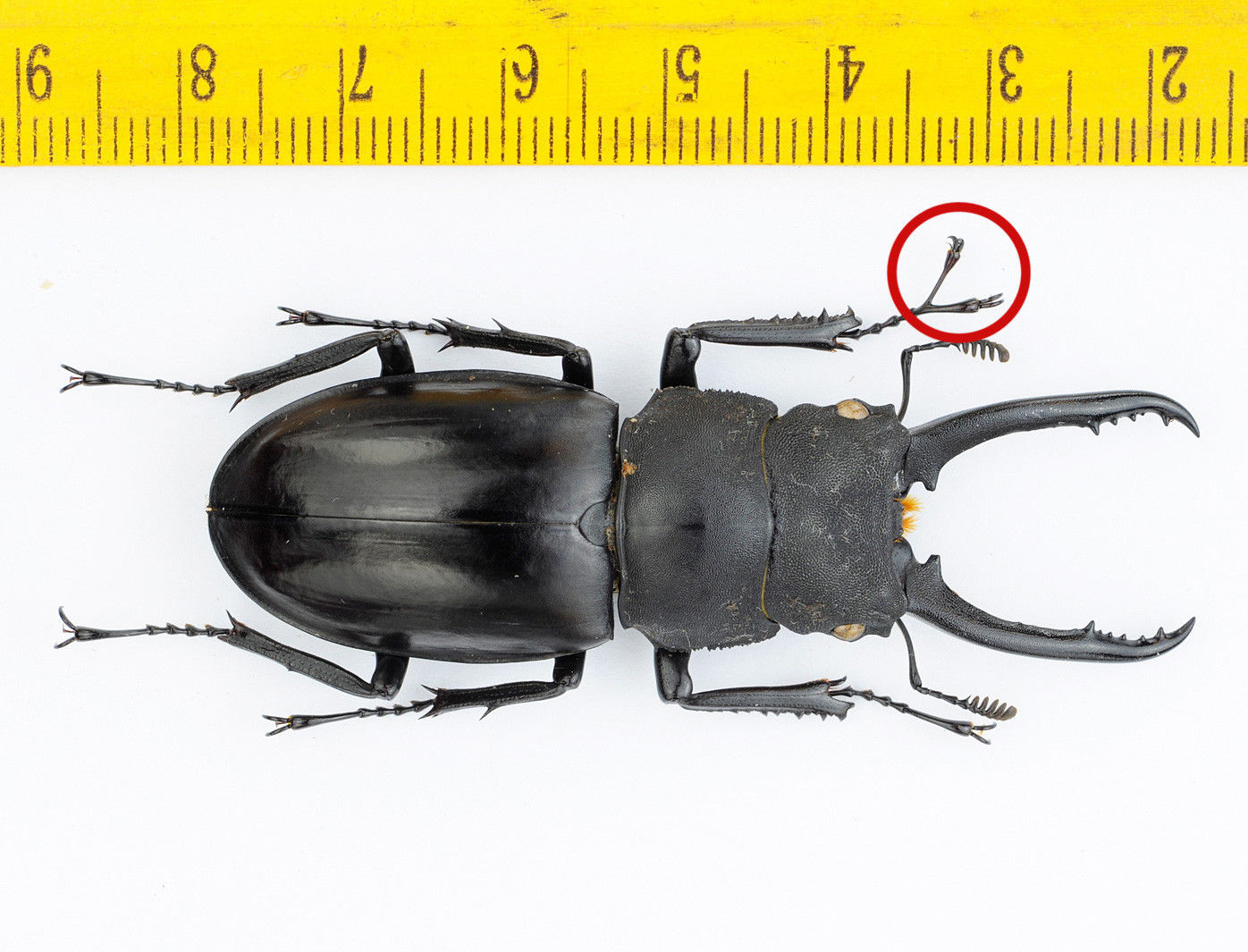
- Hexarthrius vitalisi with weird tarsus; Thailand.jpg (223.38 KiB) Viewed 3249 times
John K.
Re: Unusual and/or unique Scarabeidae
Posted: Wed Mar 15, 2023 3:05 am
by boghaunter1
A rare older online specimen of an Albino G. cacicus? It has a white thorax & white eyes...
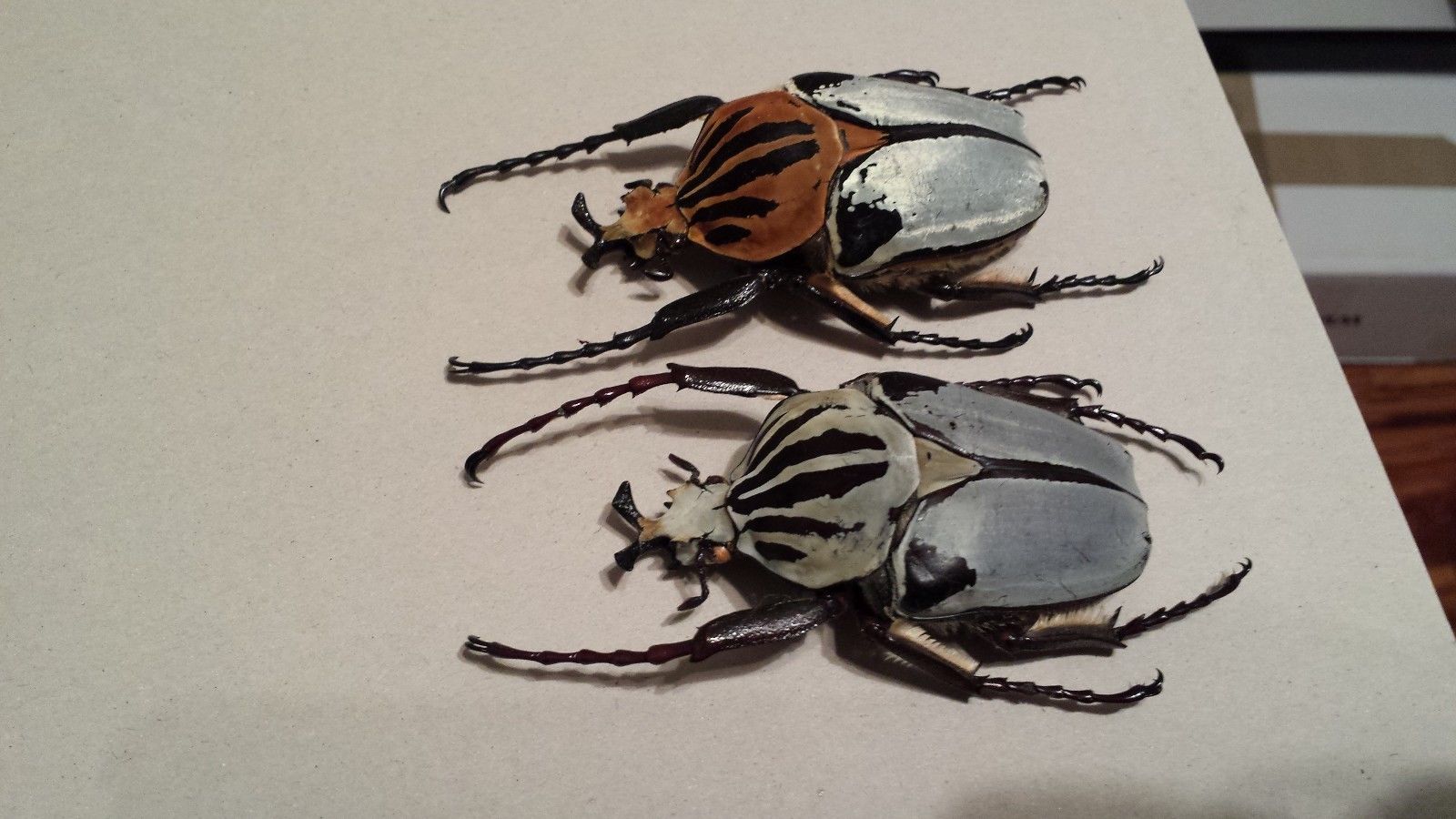
- Weird G. caciaus with White Thorax & Eyes - Albino.....jpg (185.62 KiB) Viewed 3223 times
'
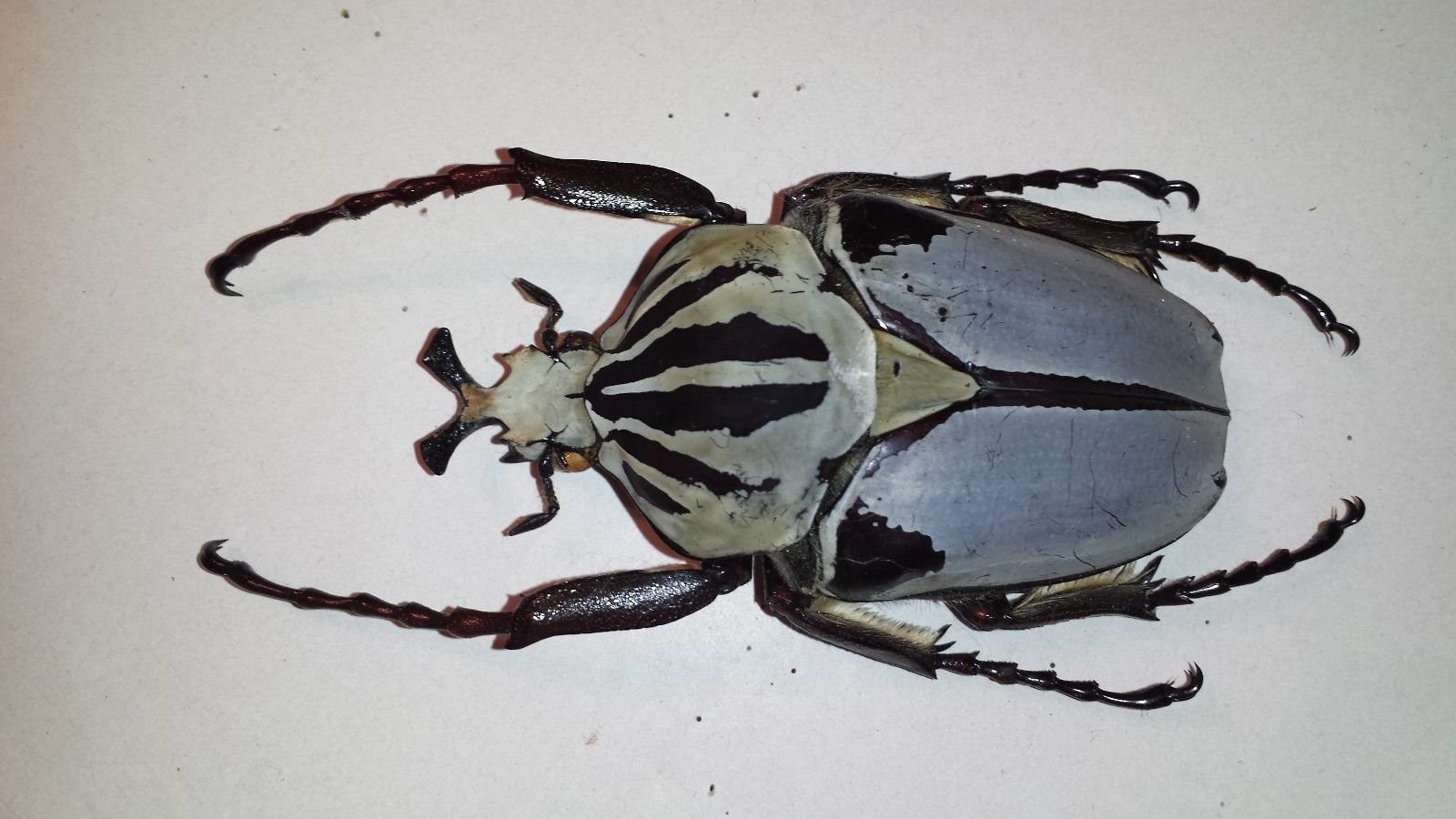
- Wierd Albino G. cacicus....jpg (176.4 KiB) Viewed 3223 times
John K.
Re: Unusual and/or unique Scarabeidae
Posted: Wed Mar 15, 2023 4:46 am
by Trehopr1
Wow John, another incredible "blast from the past"....

Man, that's like discovering a "white" buffalo amongst
the herd !
Fantastic.



✓Love the avatar by the way !
Re: Unusual and/or unique Scarabeidae
Posted: Wed Mar 15, 2023 4:48 am
by livingplanet3
boghaunter1 wrote: ↑Wed Mar 15, 2023 3:05 am
A rare older online specimen of an Albino G. cacicus? It has a white thorax & white eyes...
Bleached - either chemically, or with exposure to light. Might have started out as a degreasing effort gone wrong.
Re: Unusual and/or unique Scarabeidae
Posted: Wed Mar 15, 2023 4:54 am
by Trehopr1
Dang, livingplanet3 your right !!

I never thought to consider that possibility...
Oh' how we all hate forgeries.

Re: Unusual and/or unique Scarabeidae
Posted: Wed Mar 15, 2023 1:45 pm
by Chuck
I checked my Goliathus for comparison. Some have black eyes, some have woody brown eyes. My male cacicus has woody brown eyes.
Looking at the white cacicus above, I see that they eyes are pale brown; I've seen this in other Coleoptera but none of my Goliathus have this color eye. In that the eye is lighter that implies to me that IF it is chemically altered it was done by submersion, not just wiping off the orange on the thorax.
Note too that the hair on the legs is almost white, not tan/light brown.
On albinism in Coleoptera I found two quips:
* I do not know any case of true albinism in Coleoptera or insects in general. There are sometimes color morphs or individuals that have a lighter or darker color (melanism)
* (about a purported albino) black pigments were not observed in chitinous integuments
Therefor, I presume the white specimen is not truly an albino.
I would not know how to reproduce this white Goliathus.
Re: Unusual and/or unique Scarabeidae
Posted: Wed Mar 15, 2023 7:47 pm
by livingplanet3
Chuck wrote: ↑Wed Mar 15, 2023 1:45 pm
...I would not know how to reproduce this white Goliathus.
I just checked my e-mail records, and it turns out that back in 2015, I had a lengthy discussion with a colleague / fellow collector about this exact cacicus specimen, which was first offered on eBay as early as 2014, and he stated that he had previously achieved the same coloration result on a cacicus specimen by submerging it for a time in a powerful solvent, in an effort to degrease it. I feel I should point out that the dealer who was offering it on eBay
(who if it was who I think it was), is highly reputable, definitely would not have been trying to deceive anyone, and was undoubtedly totally unaware that this specimen had been altered (either intentionally or unintentionally).
I see that there was also a previous discussion of this specimen here on the forum (Apr 2014) -
https://archive.insectnet.com/thread/55 ... aberration
Certainly, I would not recommend using anything stronger than acetone to degrease beetles. Actually, I've really been hoping to find some effective alternative to acetone, as I have a considerable number of large, very greasy beetles in my collection that need treatment (including Goliathus spp.), and would much prefer not to use acetone, as the vapors are not only toxic, but also dangerously flammable. The chemical is also rather expensive, and difficult to dispose of properly. So, if anyone can suggest a safe and effective alternative to acetone, please do.
While we're on the topic of color-altered beetles: Dynastes hercules specimens with bluish-grey elytra (which apparently
do occur naturally, but only very rarely) used to be among the most expensive beetle specimens, and some collectors have paid huge sums for them. However, some years ago, insect dealers in Japan worked out a method for altering normally-colored specimens to produce perfect "blue" ones, using UV lamps. This soon crashed the market for such specimens.
The cacicus specimen in question, may have arrived at its pale hue via either chemical treatment, or by exposure to UV light, and this could have been either intentional, or unintentional. I'd certainly not be willing to test it due to the value of cacicus specimens, but it's also possible that a cacicus, simply left out in the sun, even with just the intention of dehydrating it, may quickly fade.
Re: Unusual and/or unique Scarabeidae
Posted: Wed Mar 15, 2023 8:13 pm
by Chuck
livingplanet3 wrote: ↑Wed Mar 15, 2023 7:47 pm
Actually, I've really been hoping to find some effective alternative to acetone, as I have a considerable number of large, very greasy beetles in my collection that need treatment (including Goliathus spp.), and would much prefer not to use acetone,
I detailed my large beetle degreasing on the archived forums, but let me summarize it:
1. I had a papered hercules ssp (which is now no longer a ssp, but I'll call it hercules) that I softened and set. I put a pin through the elytra where it goes.
2. A couple days later there was a dark brown spot around the pin. I grew over the course of days to > 50% of both elytra, turning them black/dark brown.
3. Over the course of a week, I repeatedly immersed the hercules in acetone for hours. It got much better. But within days, starting at the pin, the spot would start again and spread. I repeated all this for a month.
4. I submerged the hercules in 70% isopropyl alcohol. Immediately the brown goo spread through the alcohol, like a million microscopic starlings after a gunshot. It was stupifying, as if there were some sort of magnetic reaction. I left it in about 6 hours; it did get a bit flexible in the joints, so I repositioned it a bit, and let it dry. The brown never came back.
5. I repeated #4 above with a hercules that was all black. Same results. The elytra were, in fact, not black.
6. Neither hercules has, years later, shown any more brown / black oil seepage.
7. I tried #4 with a large Saturnid (Daesdemonia [sp?]) and as soon as it hit the alcohol it fell apart. I *think* this is because it had been rotted inside from storage in the humid jungle, and then dried out with little remaining muscle tissue. I've not tried that again.
Re: Unusual and/or unique Scarabeidae
Posted: Wed Mar 15, 2023 9:59 pm
by boghaunter1
Hi livingplanet3,
I only use acetone to lock in the colors of dragonflies... I hate the smell as well! I mentioned this in one of the older forums; I like degreasing leps/coleops with "white gasoline", aka, "Coleman" camping fuel (or equivalent brands) used in camping stoves & available in any hardware store. It has worked well for me (may take a few soaks), not so bad a smell, & is very volatile (evaporates quickly from specimens)... unfortunately also very flammable (obviously...

). I think all solvents are petroleum based & therefore extremely flammable. When degreasing specimens in any solvents don't shuffle around your carpet in wool socks that give off static sparks from your fingertips... you & everything around you could easily go up in explosive flames

. I try to use solvents only outside in the summer months to avoid the smell & fire hazard.
John K.
Re: Unusual and/or unique Scarabeidae
Posted: Wed Mar 15, 2023 10:14 pm
by boghaunter1
Forgot to mention - an interesting discussion on the questionable albino G. cacicus. So then in conclusion... it is absolutely/completely impossible for a natural occurring albino beetle??... ever??... hmmm...

I do, however, like the bleaching theory as the thorax still has a very faint hint of orange... Would like to see some other "albino' beetles... anyone?
John K.
Re: Unusual and/or unique Scarabeidae
Posted: Wed Mar 15, 2023 10:49 pm
by alandmor
Gymnetis stellata (Latreille, 1833) has to be one of the more unusual and strikingly colored fruit chafers (Scarabaeidae: Cetoniinae). Known from Mexico, Central America and northern South America, the bright color and bold patterns are thought to be a form of disruptive coloration to break up its outline making it harder for a predator to recognize. No idea how well it works but it sure makes for an unusual and beautiful beetle. A number of other Gymnetis species have similar patterns and bright coloration but not as nice as this one.
Image source: BioLib.cz
Re: Unusual and/or unique Scarabeidae
Posted: Thu Mar 16, 2023 6:18 pm
by livingplanet3
alandmor wrote: ↑Wed Mar 15, 2023 10:49 pm
Gymnetis stellata (Latreille, 1833) has to be one of the more unusual and strikingly colored fruit chafers (Scarabaeidae: Cetoniinae)...
A spectacular species! These don't seem to be offered for sale very often, and when they are, the price is quite high. G. pantherina is another Gymnetis species with remarkably beautiful coloration -
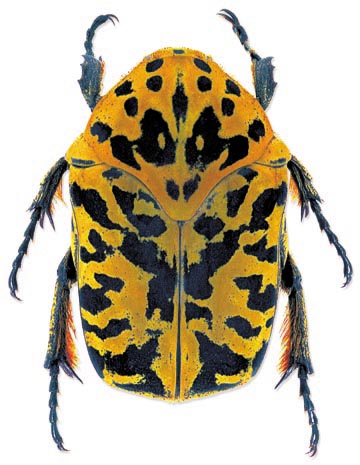
Source:
http://www.living-jewels.com/photo.htm
While we're on the subject of the cetoniine tribe Gymnetini, below is Argyripa (=Howdenypa) gloriosa, an endemic from Colombia. It's almost impossible to convey how beautiful this beetle is, via a photograph, as this species is opalescent and changes hue with viewing angle. Very rare even in large museum collections, and extremely pricey whenever one comes up for sale. I've only ever seen a single specimen in person, many years ago in a private collection -

Source:
https://www.flickr.com/photos/140413390@N06/28221872308
Re: Unusual and/or unique Scarabeidae
Posted: Thu Mar 16, 2023 7:01 pm
by Panacanthus
livingplanet3 - you are very accurate in your description of the appearance of H. gloriosa! Many beetles have an opalescent appearance to them, but H. gloriosa somehow takes it to another level. The depth and "glow" is unique and almost unmatched, and must be see in person to be fully appreciated.
Sorry for such poor photos (took them years ago), but here is a pair of H. gloriosa (not prepared yet). They are among my most favorite specimens. The top and bottom images show the same pair at different angles - the color change (at various angles) in these is very extreme - far more than the photos can show. Male is on the left.
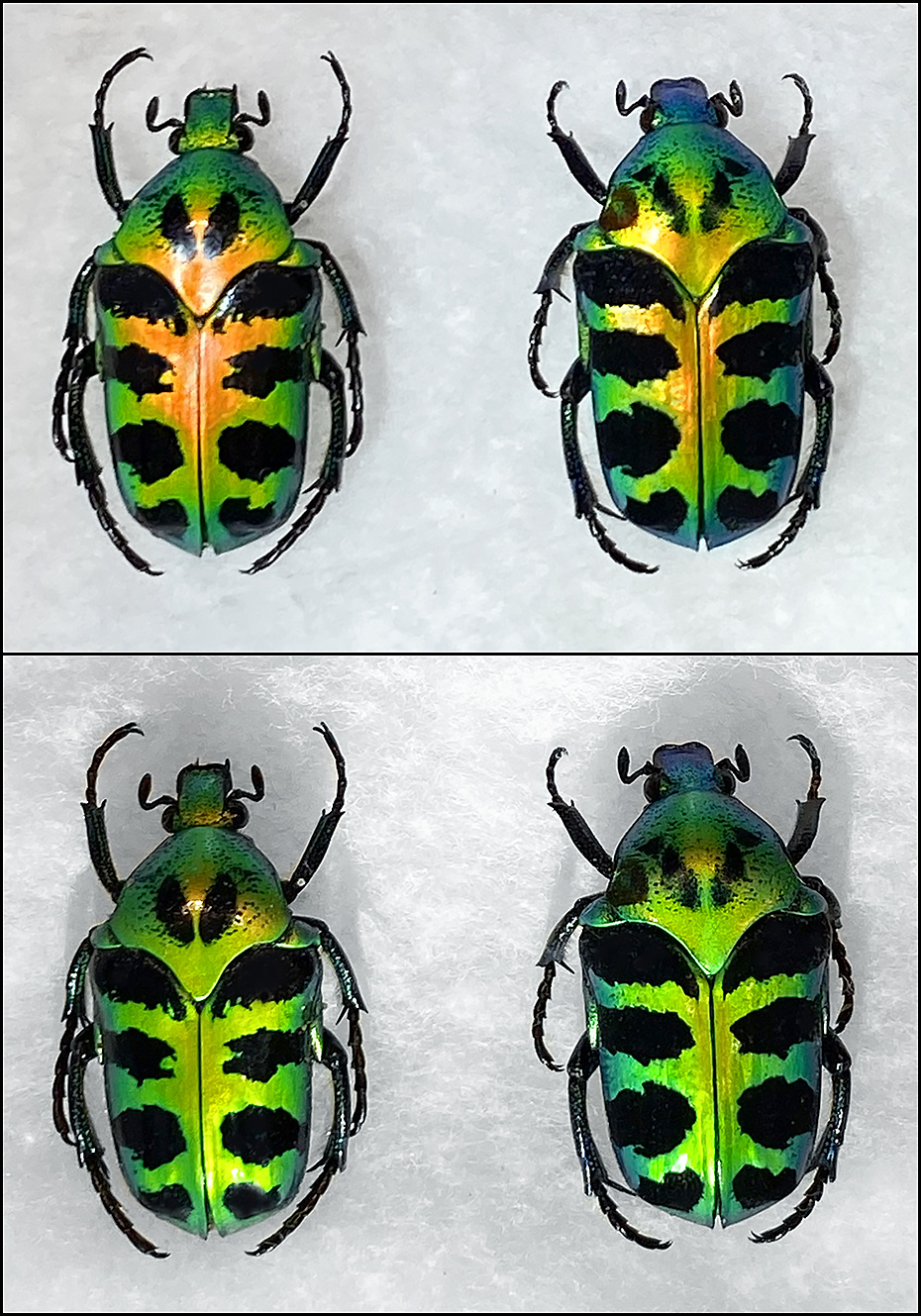
- H. gloriosa 2 IN.jpg (622.6 KiB) Viewed 3126 times
Re: Unusual and/or unique Scarabeidae
Posted: Fri Mar 17, 2023 4:35 pm
by livingplanet3
Chuck wrote: ↑Wed Mar 15, 2023 8:13 pm
I detailed my large beetle degreasing on the archived forums, but let me summarize it:...
Thanks for the info; 70% isopropyl alcohol would certainly be less expensive than acetone, and perhaps not quite as hazardous to work with, I believe?





